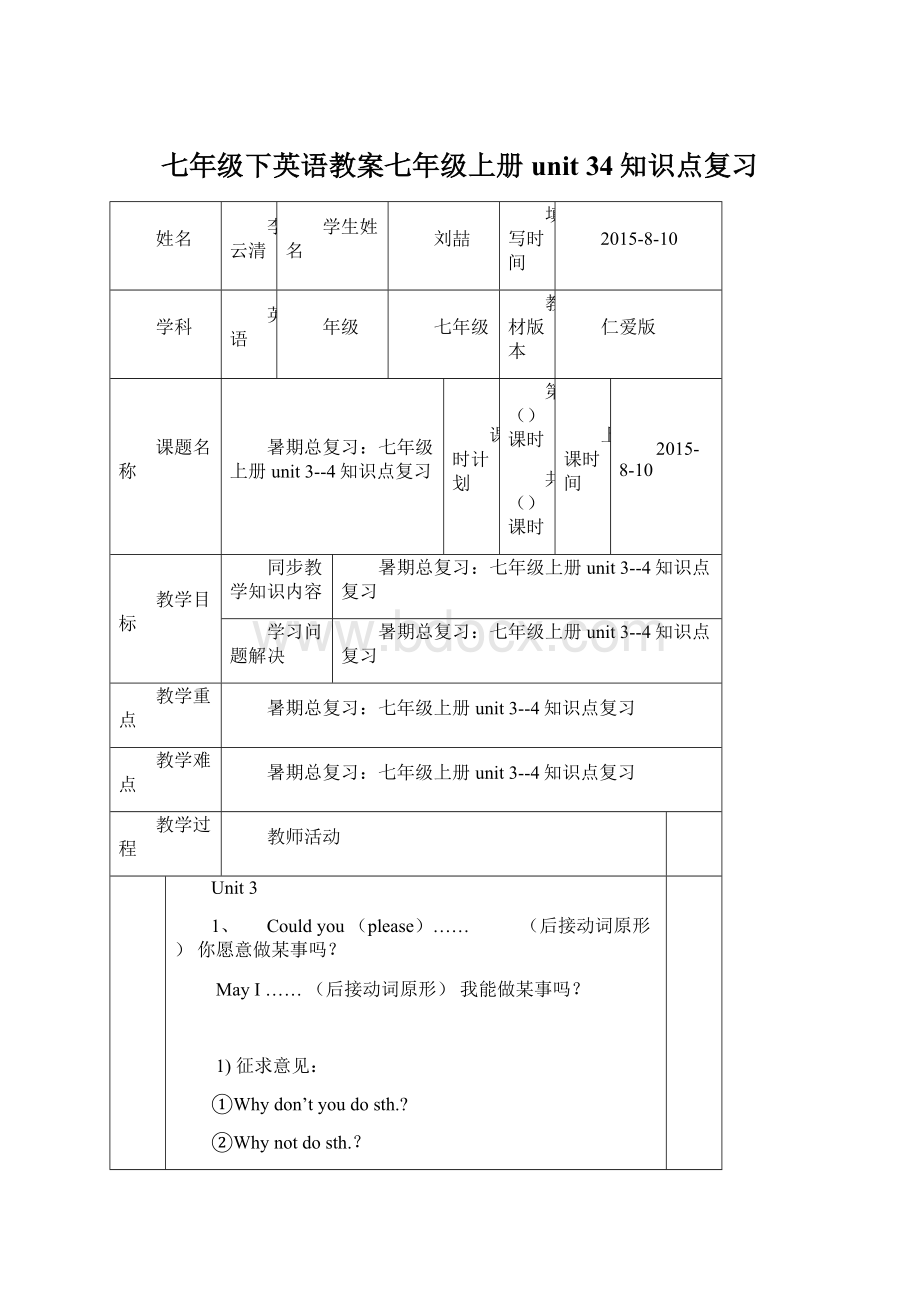七年级下英语教案七年级上册 unit 34知识点复习文档格式.docx
《七年级下英语教案七年级上册 unit 34知识点复习文档格式.docx》由会员分享,可在线阅读,更多相关《七年级下英语教案七年级上册 unit 34知识点复习文档格式.docx(35页珍藏版)》请在冰豆网上搜索。

How/Whataboutmeetingattheschoolgate?
Let’smeetattheschoolgate.
Shallwemeetattheschoolgate?
Wouldyouliketomeetattheschoolgate?
2)回答对方的建议:
Goodidea./Allright./Ok.
Sorry,Iamsobusy.
Iamnotsure.
Iamafraid….
2、livein+地点住在某地
livewith+人和某人住在一起
练习:
.Where______he______?
(live)
He______inEngland_________hisparents.
翻译句子:
我与父母住在一起。
我的姐姐住在北京。
3、Whatdoeshesayintheletter?
他在信里说了些什么?
Whatdoeshesayonthephone?
他在电话里说了些什么?
4、alot=verymuch放在句末,修饰动词,非常……例:
Iliketheboyalot/verymuch.
notatall一点也不……例:
Idon’tliketheboyatall..
5、eachother相互,彼此studentsoftentalktoeachotherinclass.
6、
dosth.withsb
.
和某人一起做某事
Iliketogoshoppingwithmyfriends.
7、
Noproblem
没问题,用于口语中,表示很愿意做某事
--CouldIgowithyou?
--Noproblem.
8、
speak+语言
说某种语言speakEnglishspeakChinese
辨析:
speak/say/talk/tell.说
1)speak说话/语言
HecanspeakEnglish/Chinese/French.
MayIspeaktoJim?
ThisisJimspeaking.
2)say说具体的内容。
Theteacherssaythatwearegoodstudents.
IcansayitinEnglish.
3)talk谈话(talktosb.,talkwithsb.,talkabout…)
Wearetalkingaboutthestory.
Hismotheristalkingwithourteacher.
4)tell告诉(tellsb.sth.,tellsb.todosth.,tellsb.nottodosth.)
Hetoldussomeimportantnews.
Tellthemtoturnoffthelights.
Tellhimnottoplayinthestreet.
9、
HewantstovisittheGreatWall长城
want意为“想,想要”,常用结构:
wanttodosth.想要做某事
IwanttolearnJapanese.我想学日语。
visit意为:
访问,参观,拜访,后面常接表示人或地点的名词,Iwanttovisitmyteacher.
练习:
What_____he_____intheletter?
(say)
He______tovisittheGreatWall.(want)
10、
come/goto+地点
去某地但home、here、there 这些是副词,前面不能加to
例:
gohome/comehere/gothere
gotodosth.去做某事
例:
Theygotoplaybasketball.
11、
likedoingsth.
喜欢做某事
liketodosth.想要做某事
12、
It’s+adj.+of(for)
sb.todosth.
对某人来说是……的
It’skindofyoutohelpme.
13、
helpsb.withsth.
=helpsb.(to)dosth.
帮助某人某事
14、I'
mhome.
我回来了.
behome意为:
到家,常用于口语。
常用Istay(at)home或I’mathome表示:
我在家里。
beathome=bein在家gohome回家
gethome到家inone’shome在某人的家里
15、
officeworker
办公室职员cook厨师cooker炊具
16、
onafarm
在农场上onthesofa
在沙发上
17、
aphotoof
one’sfamily
某人的全家照FamilyTree家谱(首字母都大写)
18、inahospital在医院(纯属地点概念)inhospital因病住院
Heisillinhospital.他生病住院
Heisinahospital.他在医院里(不一定是因为生病来到医院)
19、
lookaftersb.=takecareof
sb.
照顾某人
与look相关的短语:
lookat看着lookthesame看起来很像
looklike看起来像lookdifferent看起来不一样
lookdifferent看起来不同havedifferentlooks长相不同
20、teachsbsth=teachsthtosb教某人某东西
MyfatherteachesmeEnglish.我爸爸教我英语。
teachsbtodosth教某人做某事
MyteacherteachesmetospeakEnglish.我老师教我说英语。
—Whoteaches_______English?
—MrBrown.
A.themB.theyC.their
Hersisterlikesthephotos.(改为一般疑问句)
_______hersister_______thephotos?
21、
helponeself(tosth.)
请随便(吃……)
主人在招待客人用餐时的常用语。
若被招待的人是一个人,用
helponeself,若是两个人以上,用yourselves。
如:
helpyourselftosomefish.请随便吃些鱼。
22、Wouldliketodosth.=wanttodosth.
想要做某事
wanttodo.想做某事
plantodo.计划做某事
wouldliketodo.想做某事
hopetodo.希望做某事
wish(sb.)todo.希望某人做某事
Iwanttohaveacupoftea.
HeplanstohaveapicnicthisSunday.
ShehopestogotoAmerica.
Iwishtogotothemoonmyself.
Iwishyoutobeherenow.
23、Wouldyoulikesomethingtoeat(drink)?
你想要一些吃(喝)的东西吗?
toeat或todrink修饰something,作为后置定语。
Wouldyoulike+名词或动词不定式+……?
表示“你想要…吗?
”这种建议常希望对方给予肯定答案,用于礼貌的提议或邀请,有时含有请求的意味。
-----wouldyoulikeacupoftea?
你想要杯茶吗?
-----Yes,please./No,thanks好的./不,谢谢。
wouldlike意为:
要,喜欢,想要,用于礼貌表达愿望,相当于want。
Wouldyoulikesomeeggs?
=Doyouwantsomeeggs?
Wouldliketodosth.=wanttodosth.
Whatwouldyouliketodrink?
=Whatdoyouliketodrink?
I’dlikesth.=Iwouldlikesth.
我想要……
24、
Hereyouare
给你
25、
Whatabout……==Howabout
……
……怎么样?
后接代词或名词,还可以接动名词(即Whataboutdoingsth.)
26、
all
right
好的
27、
acupoftea
一杯茶twocupsoftea两杯茶
28、
Whynot……(后接动词原形)=Whydon’tyou……后接动词原形)
为什么不做某事呢?
是表示提供建议的一种说法,意为:
为什么不……?
回答:
Goodidea
好主意;
29、
MayItakeyourorder?
可以点菜了吗?
30、
CanIhelpyou?
=MayIhelpyou?
=WhatcanIdoforyou?
需要点什么帮忙吗?
31、
eatout
出去吃饭
32、
letsb.dosth
让某人做某事
33、
havedinner/breakfast/lunch/supper
吃正/早/午/晚餐
34、
akindof
一种……allkindsof
各种各样的……
35、
befriendly/kindtosb.
对某人友好
Theyareallkindtome.他们都对我很好。
1)all表示三者或三者以上都,放在be动词,助动词和情态动词后面,实义动词前面
2)bekindtosb对某人友好。
=
befriendlytosb.
对某人友好
Kind词性有两种:
adj(友好的)、n(种类)
一种……Allkindsof各种各样
36、begladtodosth.
Iamgladtomeetyou,
I'
mverygladtobehere.我很高兴来这里。
Begladtodosth很高兴做某事。
翻译:
我很高兴能帮助你。
37、Howmany+可数名词复数(多少)
Howmuch+不可数名词(多少)
Howmuchis/are问价格
Howoften频率(多久一次)
Howlong时间多久,物体多长(for+时间)
Howsoon时间多久(in+时间)
Howfar距离多远
Howmanybooksarethereinyourbag?
Howmuchwaterdoyouwant?
Howmuchisaglassofwater?
Howoftendoyougoswimming?
HowlongcanIkeepthebook?
Howlongisthedesk?
HowsoonwillyouleaveforBeijing?
Howfordidherungustnow?
Ⅰ.单项选择。
(10分)
()1.Wouldyoulike____eggs?
A.anyB.someC.muchD.alot
()2.Shedoesn’thave____.
A.somemilksB.anymilksC.somemilkD.anymilk
()3.Whatwouldyoulike____lunch?
A.atB.onC.forD.in
()4.Whynot____somemilk?
A.eatB.drinkC.toeatD.todrink
()5.—Whatwouldyouliketodrink?
—____
A.Somecakes.B.Twoglassoforangejuice.
C.Twoglassesofapplejuice.D.Twoglassesofapplejuices.
()6.We’dlike____.
A.eatsomethingB.drinksomethingC.somethingeatD.somethingtoeat
易误辨析
⒈afew与few
都修饰可数名词afew:
“几个”﹙表示肯定﹚;
few:
“没几个”﹙表示否定)。
2.alittle与little:
都修饰或指代不可数名词。
⑴.little:
“一点”﹙表示否定﹚
①.adj.﹙修饰不可数名词﹚
②.adv.﹙修饰形容词或其它副词等﹚
③.pron.﹙代替不可数名词﹚
⑵.alittle:
“一点”﹙表示肯定﹚
①.adj.﹙修饰不可数名词=abitof﹚
②.adv.﹙修饰形容词或其它副词等=abit﹚
3.some与any
⑴.some:
“一些”
①.adj.修饰名词,用于肯定或委婉疑问句中。
②.pron.代替名词,用于肯定或委婉疑问句中。
⑵.any:
①.adj.修饰名词,用于否定或非委婉疑问句中。
②.pron.代替名词,用于否定或非委婉疑问句中。
③.adj.pron.“任何”﹙可用于肯定句中﹚
4.many与much
⑴.many:
“许多”⑵.much:
“许多”
①.adj.﹙修饰可数名词﹚①.adj.﹙修饰不可数名词﹚
②.pron.﹙代替可数名词﹚②.pron.﹙代替不可数名词﹚
句型:
询问对发生职业或身份常用句型结构:
What+助动词(do/does)+主语+do?
回答方式是:
人称代词主格+be+职业如:
Whatdoyoudo?
你是干什么的?
I’mateacher.我是教师。
Whatdoeshedo?
他是做什么的?
Heisastudent.他是老师。
询问职业和身份还可以用下面的结构:
What+be+主语?
如:
Whatareyou?
Iamastudent.我是一个学生。
Whatishe?
Heisastudent.他是学生。
—Whatdoesthemando?
—_______.
2、Whatdoyouusuallyhaveforbreakfast?
你早饭通常吃什么?
have在此意为:
吃,喝eat(吃)
+drink(喝)=have
for介词表示“对于,就。
。
而言”
have………forbreakfast/lunch/supper早饭/午饭/晚饭吃………
在英语中,三餐分别为breakfast,lunch,dinner一般前面无冠词。
如果前面有修饰词,可用a、an。
例如:
Afterabiglunch,shegoestoschool.在吃了一顿丰盛的午餐后,她去上学了。
如果要表示三餐吃什么东西,句型:
havesthforbreakfast,lunch,dinner。
Ihavenoodlesforlunch.我午餐吃面条。
翻译:
我早餐喝牛奶。
Exercise:
1.Iamateacher.(对画线部分提问)
______doyou______?
2.Whatdoyoudo?
(同义句)What______you?
3.It’sJim’sbag.(对画线部分提问)
_______bag______it?
4.Hissisterisanurse.(对画线部分提问)
____________hissister_____?
5.他们俩都是医生。
They_________________.
6.Theseareherclassmates.(对划线部分提问)
______________these?
提问工作场所:
由where引导,结构为:
Where+do/does+主语+行为动词。
1.Wheredoyouwork?
Iworkinahospital/school
2.Wheredoeshe/shework?
He/sheworksinanoffice/onafarm.
Completethefollowingsentences.
1.Sheworksinahospital.Butsheisn’tadoctor.Whatdoesshedo?
Sheis________.
2.Shestudiesinaschool.Sheis__________.
3.Weworksonafarm.Weare__________.
4.Hedrivesabus.Heis_________.
5.Theyworkinanoffice.Theyare____________.
3.
Couldyoupleasetellmeyourname?
你可以告诉我你的名字吗?
Sure.Mynameis…当然可以,我叫……
Couldyou(please)…….?
这一结构用于礼貌地请求别人做某事。
Couldyoupleasehelpme?
你愿意帮帮我吗?
—Excuseme,c_____youpleasetellmeyourname?
—Sure,mynameisLiHong.
4.ManystudentsinourclasslikeEnglishalot,Idon’tlikeitatall.
我们班许多学生都非常喜欢英语,但是我一点也不喜欢它。
alot意为:
很,非常(表示程度),相当于verymuch,alot=verymuch放在句末,修饰动词,非常……
not……atall意为:
一点也不
Idon’tlikeapplesatall.我一点也不喜欢苹果。
Idon’tlikethefoodatall.我一点儿也不喜欢那食物。
HisEnglishisvery____andhespeaksEnglishvery____.
A.good;
goodB.well;
wellC.well;
goodD.good;
well
alittle与afew
[辨析] 两者均为肯定意义。
afew修饰可数名词复数,alittle修饰不可数名词,都表示“一些,少数”之意。
另外,alittle还可用作程度副词,修饰形容词、副词或比较级,还可修饰动词。
little和few均是否定意义,表示“几乎没有”。
活学活用
选词填空(few,little,afew,alittle)
(1)Thereis______waterinthebottle.瓶子里有一点儿水。
(2)Thereare______grapesintheplate.盘子里有一些葡萄。
(3)_____peoplelivetobe150.几乎没有人能活到150岁。
(4)Thereis_____orangeinthebottle.
Wehavetobuysome.瓶子里几乎没有橘汁了,我们必须买一些。